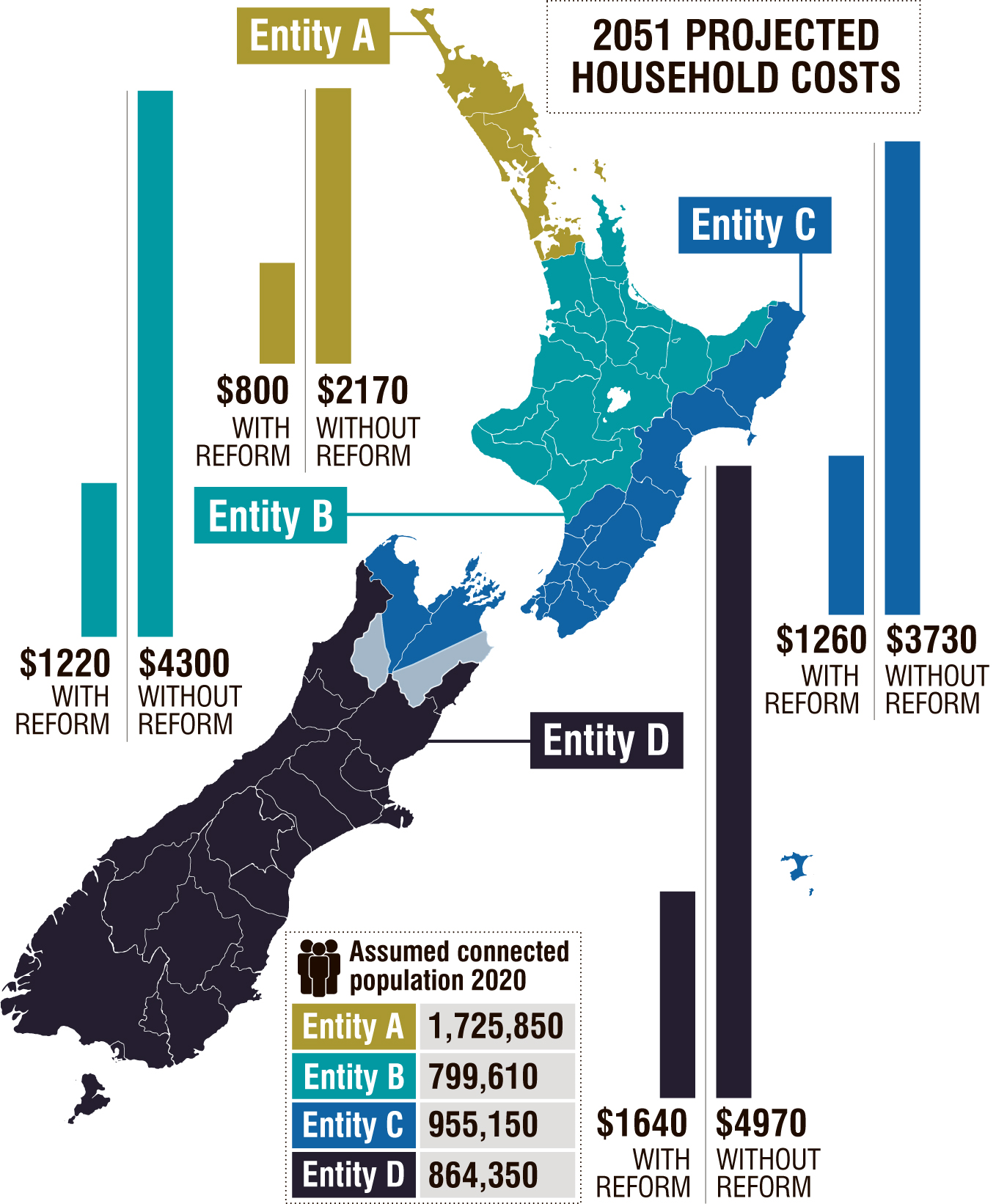
The centralised water reforms presented by the Government this morning would result in the vast majority of the South Island, based along Ngai Tahu territorial boundaries and excluding the very top of the island, being served by one entity.
- 'Huge' risk hangs over promised savings for Southern ratepayers
- Expected savings in your patch from water reforms
Local Government Minister Nanaia Mahuta revealed the proposals, along with "dashboards" showing how much water bills would cost ratepayers in each council area this morning – the first time such information has been made available either to the public, or councils.

With the overhaul, on average, households in the south would spend $1640 a year on water bills by 2051, according to the Government's case for the changes.
Without the reform households within the southern entity's boundary would pay an average of $4970 a year.
In some districts, including Clutha, Waitaki, and Queenstown, the household water bill could reach $9000 or more a year in 30 years' time without the reforms, the information suggests.
The multi-region water entities would remain owned by local councils in their boundaries, protected by a provision requiring a referendum with a 75% majority voting for privatisation.
They would be governed and managed by people appointed by an independent panel, itself appointed by a representative group of local council and mana whenua delegates.
Consultation with communities would be required when developing strategy, investment plans and proposed prices or charges, similar to what councils do now.
The entity’s financial and operational autonomy would allow them to borrow, free from local government debt restrictions.
But the water entities would not pay their owners any dividends.
And an economic regulator would be established to ensure good financial performance by the four water monopolies.
That would sit alongside Taumata Arowai, the drinking water regulator, that was created to take over from the current drinking water regulator, the Ministry of Health.
Councils' water assets, and debt, would be transferred to the new entities.
Figures on the financial impact of the reform on each council will be released mid-July.
The household costs provided in the information are modelled on existing water systems and make no allowance for any significant extension of systems beyond what currently exists.
Extra costs have been factored in for areas in which geography and lower population bases are issues.
A decision on whether the reformed system would be opt-in or opt-out was not released.

However, yesterday the Whangarei District Council voted to provisionally opt out of the reforms citing, among other complaints, that the government had withheld data about the water reforms and refused multiple requests for information, not meeting "good faith obligations".
It was also concerned if it was put in a new water entity with Auckland, the supercity would consume all of the entity's attention.
"The Government will continue to work with the sector, iwi and industry on some of the details to give these transformational reforms the best chance of success. We will be making further announcements in the coming weeks, including a three waters reform support package for councils and their communities," Ms Mahuta said.
At the start of the month, the Government released expert advice from the Water Industry Commission for Scotland that revealed up to $185 billion was needed by 2051 to make sure New Zealand's three waters infrastructure met public health and environmental standards.
It also said the reforms could add up to a $23 billion to New Zealand’s Gross Domestic Product, and create 9260 new jobs.
The Commission report considered amalgamation of the country’s 67 territorial authorities, Watercare, and Wellington Water, into anywhere from 13 entities across the country down to just one.
It argued one to four entities provided the greatest opportunity for scale efficiencies and related benefits, including more affordable household bills.
A suite of Cabinet papers proactively released today said four multi-regional entities struck the right balance of the economic benefit of amalgamation with water catchment considerations and local interests.
A year ago, the reforms were announced at the location of the water bore that was found to be the source of the fatal Havelock North campylobacter outbreak in 2016.
The health and safety concerns with locally operated water supplies initiated the overhaul.
The Government today says the reforms are critical for:
• public health and wellbeing
• environmental outcomes
• economic growth and employment
• housing and urban development
• adapting to the impacts of climate change
• and mitigating the effects of natural hazards.
"We have seen the effects of a system in crisis: fatalities from bacteria in drinking water, broken sewer pipes, poorly treated wastewater running into streams and rivers, no-swim notices at the beaches, regular boil-water notices, and lead contamination," Ms Mahuta said.
hamish.maclean@odt.co.nz
Comments
This Government's foray into central planning is disturbing and it will lead to political rather than community need outcomes. It has neither the talent or the mandate to nationalise community assets and make a success of it. Our own council needs to resist this move by Government to nationalise assets such that our dependence on a dysfunctional and self-interested government service and incompetent government is increased.












